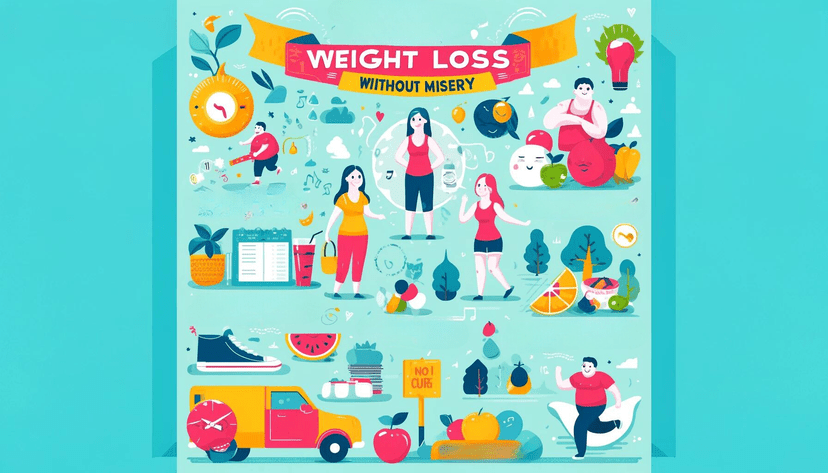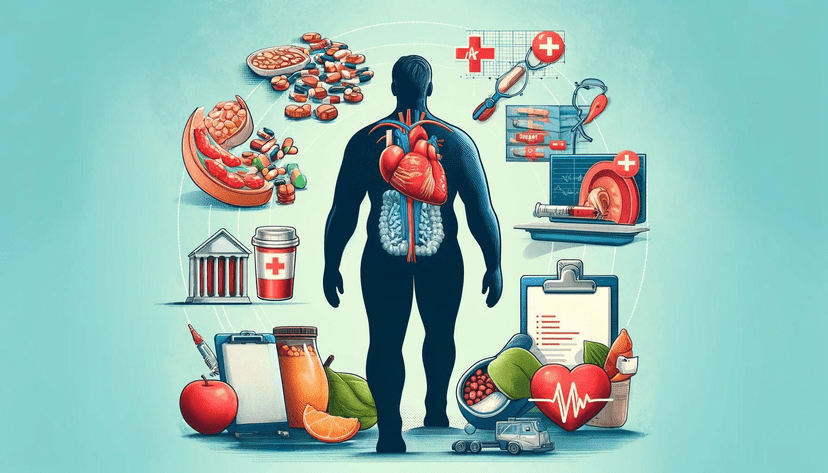Habit swaps that can make a difference to your weight loss

Dietary Habit Swaps for Weight Loss
In the quest for a healthier weight management and improved overall health, modifying dietary habits can make a significant difference. Implementing small but impactful changes can help reduce calorie intake while improving nutritional value, creating health benefits far beyond weight loss. Let's uncover a few key habit swaps that could be integrated into your daily routine.
Choosing Healthier Beverage Options
Beverages can be a hidden source of excessive calories and sugars. Simply swapping sugary drinks, such as soda, energy drinks, or heavily sweetened coffee, with healthier alternatives can substantially decrease your daily caloric intake. A common culprit in an unhealthy diet includes sugary drinks, which are high in empty calories (calories that do not supply any nutrients) and can contribute to weight gain and other health problems like obesity and type 2 diabetes.
Making a habit to choose water or unsweetened beverages over sugary ones can make a considerable change. Water is essential for our bodies to function properly, and it's calorie-free. Unsweetened options like herbal teas or infused water (water flavored naturally with fruits or herbs) can also be satisfying alternatives to sugary beverages. Making this swap doesn't just decrease your sugar intake; it also benefits your overall hydration which is crucial for all bodily functions.
Opting for Whole Grains and Fiber-Rich Foods
One of the primary factors contributing to weight gain is the consumption of refined carbohydrates. Items such as white bread, white rice, and processed goods often contain refined grains, stripped of their beneficial nutrients, and have a high Glycemic Index, causing fast and high spikes in blood sugar levels. This, in turn, can lead to a rapid drop in energy levels, inducing hunger, and causing overeating.
Swapping these refined products with whole grains can introduce more nutrients into your diet and keep you fuller for longer, aiding in weight management. Whole grains such as brown rice, oats, and whole wheat bread not only maintain their natural fiber but also provide B vitamins and important minerals, such as iron, magnesium, and selenium that are removed during the refining process. The dietary fiber found in these foods aids digestion and contributes to sustained energy release, keeping your appetite in check.
Snacking Smart with Fruits and Vegetables
It's prudent not to overlook the role of snacks in your diet. Excessive snacking or indulgence in high-calorie snacks can be detrimental to weight loss. However, that doesn't mean you have to eliminate snacks. Instead, try swapping high-calorie snacks with fruits and vegetables.
Fruits and vegetables, rich in fiber, various vitamins, minerals, and antioxidants, are inherently low in calories and high in volume, keeping you feeling satiated without the significant calorie cost. This means you can eat quite a large portion without consuming too many calories, making them the perfect snack.
Whether you choose to swap your mid-afternoon chips for carrots with hummus, your candy for a sweet piece of fruit, or your nightly bowl of ice cream for Greek yogurt with berries, incorporating more fruits and vegetables into your diet alongside planned meals benefits your weight loss and provides an abundance of nutrients.
It's critical to approach habit swaps as that - new habits to develop, rather than temporary changes. With time, these positive changes to what you eat and drink can indeed become second nature, and the benefits will be more than worth the effort. Remember, gradual and sustainable changes are the key to long-term health improvements and strategic weight loss.
Physical Activity Habit Swaps to Boost Weight Loss
When it comes to weight loss, it is important to remember that every little bit of physical activity counts. Rather than trying to overhaul your entire lifestyle at once, consider making simple habit swaps to increase your physical activity levels gradually. These changes can be easily incorporated into your daily routine and can have a significant impact on your weight loss journey.
Incorporating Movement into Daily Tasks
One effortless yet effective strategy is to start incorporating more movement into tasks you already do daily. For example, instead of using the elevator, choose to take the stairs. This swap alone can significantly increase your daily step count and elevate your heart rate, resulting in an overall higher caloric burn.
Another example could be during your commute. If possible, park your car a little further away from your destination and enjoy a short walk. This idea also applies if you use public transportation: get off one stop before your usual one and walk the remaining distance. Not only does this add a dose of fresh air to your day, it can also facilitate additional calorie burning.
Similarly, try to incorporate short walks into your lunch or coffee breaks. Just a brisk ten-minute walk can help speed-up your metabolism and keep you energized for the rest of the day.
Choosing Active Hobbies Over Sedentary Pastimes
Another beneficial habit swap involves reconsidering the way you spend your leisure time. Instead of engaging in sedentary activities such as watching TV, reading, or playing videogames, consider opting for more active hobbies. This doesn't necessarily mean going to the gym or playing a sport, simple activities like gardening, dancing, cycling, or even walking your dog can greatly contribute to your daily caloric output.
This change in favor of more active hobbies can not only aid weight loss, but it also helps to reduce the risk of cardiovascular diseases and promotes overall well-being both physically and mentally.
Making Exercise a Regular Part of Your Routine
Lastly, try to make exercise a regular part of your routine. While this might seem daunting at first, it's essential to remember that exercise doesn't have to be all about running on a treadmill or lifting weights. The key is to find a physical activity you enjoy, which significantly boosts the likelihood you'll stick to it in the long term.
Consider engaging in activities that can be easily integrated into your daily routine. This could range from morning yoga, to lunchtime workouts, to evening walks. Remember, consistency is key in this journey. Making exercise a habit, no matter how modest, is a solid strategy towards effective, sustainable weight loss.
In conclusion, with a few strategic habit swaps you can fittingly incorporate physical activity into your daily life and advance your weight loss journey. The key is to start small, remain consistent and enjoy the process.
Lifestyle and Behavioral Habit Swaps for Long-Term Success
Effecting change in our daily routines, from the way we sleep to the way we interact with others, can have a profound impact on our weight management journey. To set the stage for sustainable weight loss and maintenance, we need to adopt broader lifestyle and behavioral changes.
One approach is improving your sleep hygiene, a key aspect largely overlooked in weight management discussions. The other strategy is managing emotional eating through mindfulness or other stress management techniques. Lastly, we'll delve into the role of social connections in encouraging healthy habits. With these habit modifications, you're bound to find a roadmap for lasting success.
Prioritizing Quality Sleep for Weight Management
Sleep deprivation is a silent enemy of weight loss. Lack of quality sleep can lead to hormonal imbalances, specifically ghrelin and leptin. Ghrelin, the 'hunger hormone,' increases when we're sleep-deprived, making us feel hungrier. Concurrently, our 'satiety hormone' leptin decreases, leaving us unsatisfied after eating. Together, these hormones can lead us to consume more calories. Furthermore, less sleep correlates with decreased glucose metabolism and increased insulin resistance, both known to contribute to weight gain.
How can we combat this? Creating a sleep-friendly environment and adhering to a sleep schedule can vastly improve sleep quality.
Some steps towards this include:
- Limiting exposure to blue light devices at least 2 hours before bedtime.
- Conditioning your bedroom environment — cool, dark, and quiet.
- Ensuring consistency in your sleep timings, even during weekends.
Replacing Emotional Eating with Healthy Coping Mechanisms
Emotional eating is a common response to stress, anxiety, or depression. However, resorting to food for comfort can sabotage our weight loss efforts and strengthen unhealthy eating habits. It's vital to find healthier ways to cope with our emotions that do not involve food.
Techniques like mindful eating, meditation, and regular physical activity can significantly help manage emotions and limit bouts of emotional eating. Try to incorporate these behavioral changes:
- Keeping a food and mood diary to identify emotional eating triggers.
- Practicing mindful eating — eating slowly, savoring every bite, and paying attention to hunger and satiety signals.
- Engaging in regular physical activity or mindfulness practices to help manage stress.
Building a Supportive Social Network
Our social environment can greatly influence our lifestyle choices, including dietary habits and physical activity. Surrounding ourselves with people who encourage healthy habits can aid our weight management journey.
Here are a few strategies:
- Find a workout buddy or join fitness groups for motivation and accountability.
- Participate in healthy cooking clubs or potlucks.
- Surround yourself with positive individuals who support and respect your weight loss journey.
Changing lifelong habits may seem daunting initially, but remember that every successful journey begins with small, manageable steps. Each swap or modification is an investment in your long-term health. In the pursuit of weight loss, your well-being is a priority. Let these habit swaps scaffold your journey to sustainable success.
In Summary
In the quest for effective weight management, this blog post has highlighted the crucial importance of small but impactful habit swaps. These swaps are categorized under dietary habits, physical activity habits, and lifestyle and behavioral habits.
Under dietary habits, the post justified the need to replace sugary drinks with healthier beverages, swap refined carbohydrates with whole grains, and trade in high-calorie snacks with nutritious fruits and vegetables.
For physical activity habits, incorporating more movement into daily tasks, choosing active hobbies over sedentary activities, and making exercise a regular part of daily life were stressed as beneficial.
Finally, we delved into broader lifestyle and behavioral changes, shedding light on the importance of quality sleep, healthy coping mechanisms as alternatives to emotional eating, and the role of a supportive social network.
In essence, this blog post emphasises adopting new, healthier habits rather than viewing these changes as temporary shifts.
Plan of Action
Whether you wish to lose weight, maintain weight, or simply improve overall health, implementing these changes could be approached in three steps:
-
Assess: Begin by assessing your current habits, identifying areas for improvement. This could relate to your diet, level of physical activity, or wider lifestyle choices.
-
Identify: Once you've identified areas for change, find suitable habit swaps. Choose swaps that are manageable and sustainable in the long run rather than drastic transformations.
-
Implement: Finally, gradually implement these changes into your routine. Be patient with yourself, as habits take time to form and become second-nature.
Action Steps
To practically implement the knowledge gained from this article, consider following the next steps:
- Step 1: Aim to replace at least one instance of sugary drink intake with water or herbal tea each day.
- Step 2: Identify an item of your diet that is high in refined carbohydrates and find a whole grain alternative.
- Step 3: Swap one high-calorie snack with a fruit or vegetable daily.
- Step 4: Incorporate small bouts of activity into your routine, such as taking the stairs instead of the elevator.
- Step 5: Identify one sedentary pastime you can replace with an active hobby.
- Step 6: Choose a form of physical activity you enjoy and incorporate it into your routine at least two times a week.
- Step 7: Prioritize sleep by creating a sleep-friendly environment and following a sleep schedule.
- Step 8: Should you find yourself turning to food for emotional comfort, try to pause and engage with an alternative coping mechanism such as breathing exercises or taking a walk.
- Step 9: Look for a community or friend that can share in and support your journey to healthier habits.
By implementing these actions, you begin a step-wise movement towards sustainable health improvements and strategic weight loss. Patience, persistence, and consistency are the keys in this journey.





